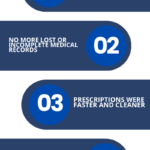In the digital age, clinics are moving away from paper files and adopting Clinic Management System (CMS) software to manage patient records, appointments, billing, and prescriptions. While this shift improves efficiency and accessibility, it also brings a critical responsibility — protecting sensitive patient data.
This is where data privacy laws come into play.
Ready to take the first step?
We’ll assist you through every step.

What Are Data Privacy Laws in Clinic Management System Software?
Data privacy laws are legal frameworks that dictate how personal and sensitive data — such as medical histories, lab reports, and prescriptions — should be collected, stored, shared, and protected.
For healthcare providers, these laws ensure that patient information is handled securely and ethically, minimizing risks of misuse or unauthorized access.
Some key regulations include:
- Digital Information Security in Healthcare Act (DISHA): The Digital Information Security in Healthcare Act (DISHA) was introduced by the Government of India to regulate the storage, sharing, and security of digital health data. Its goal is to create a secure, patient-centric healthcare ecosystem where individuals have control over their health information.
- Personal Data Protection Act (PDP Act) 2023: The Personal Data Protection Act (PDP Act) 2023 is India’s overarching privacy law that governs the collection, processing, and storage of personal data, including sensitive health data. It is India’s equivalent to the EU’s GDPR.
- National Digital Health Mission (NDHM) Guidelines: The National Digital Health Mission (NDHM), a component of the Ayushman Bharat Digital Mission, seeks to establish a unified digital healthcare infrastructure in India. It is designed to enhance healthcare delivery by making it more connected, accessible, and secure.
Why It’s Important to Know These Laws?
Understanding data privacy laws isn’t just a legal obligation — it’s a matter of trust and patient safety. Clinics deal with highly sensitive health records, and a single breach can lead to:
- Legal penalties and fines for non-compliance
- Loss of patient trust and damage to reputation
- Medical identity theft risks for patients
- Operational disruption due to investigations
By knowing and applying these laws, clinics can:
- Avoid costly legal consequences
- Build stronger relationships with patients based on trust
- Ensure smooth and secure operations
Simply put, awareness of data privacy laws is not optional; it’s a core part of ethical and effective healthcare management.
6 Best Practices for Data Privacy in Clinic Management Software
Here are the 6 best practices for data privacy in clinic management software:
- Encryption – Ensure all patient records are encrypted, both in transit and at rest.
- Role-Based Access Control – Limit data access only to authorized staff.
- Regular Backups – Secure backups help protect against data loss or cyberattacks.
- Patient Consent – Always obtain informed consent before sharing records.
- Audit Trails – Keep logs of all data access and changes for legal compliance.
- Staff Training – Educate staff about cybersecurity and privacy protocols.
Conclusion
Incorporating a clinic management system software is a step toward modern, efficient healthcare, but it comes with the responsibility of safeguarding patient data. By staying informed about data privacy laws, clinics can protect their patients, maintain compliance, and ensure ethical medical practice.
Kiddoklinik is a clinic management software that makes clinic management simpler. Our software helps to manage appointments, create prescriptions, and generate invoices. Contact us to learn more about us!
FAQs
Q 1: What is the role of data privacy laws in clinic management software?
Data privacy laws ensure that sensitive patient information stored in clinic management software is collected, processed, and shared securely. They protect patients from unauthorized access, misuse, and identity theft while ensuring clinics comply with legal requirements.
Q 2: How can clinics ensure compliance with data privacy laws?
Clinics can ensure compliance by using software with encryption, role-based access control, consent management, and audit trail features. Regular staff training on data protection practices is also essential for maintaining compliance.
Q 3: What happens if a clinic fails to follow data privacy regulations?
Failure to comply with data privacy laws can result in heavy fines, legal action, reputational damage, and even loss of operating licenses. It can also lead to serious risks for patients, such as medical identity theft.



